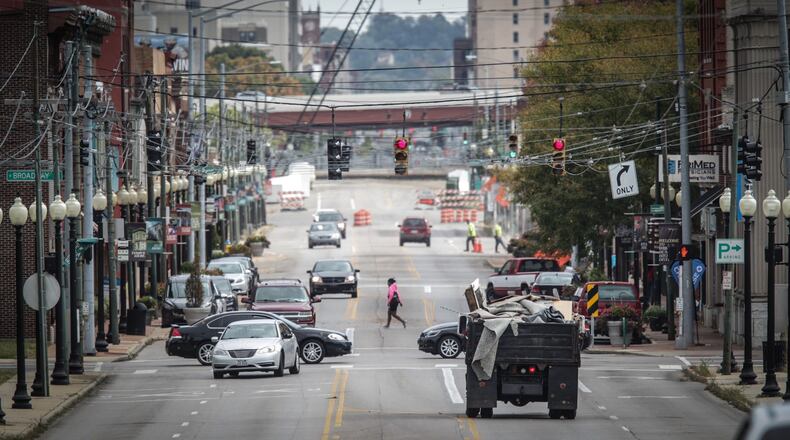This decision means property owners aren’t being charged fees to help maintain and upgrade the street lighting system, but it also created a $2.5 million gap in the city’s 2021 budget, said Diane Shannon, Dayton’s director of procurement, management and budget.
Dayton’s general fund revenues have taken a major hit because of the coronavirus economic crisis, and city officials say they expect to make a decision about the program in the first quarter of this year.
“It is our intention is to pursue renewal in the future,” Shannon said. “After reviewing the relevant economic data, the city manager will formulate a recommendation to the city commission on whether to move forward in 2021.”
By late summer, more than half of Dayton’s street lights and all street lights the city owns will be LEDs, which is the culmination of six years of work to improve the lighting systems along local roadways and sidewalks.
Dayton’s street light assessment program expired in mid-2020, which means property owners no longer are being charged fees to help pay for installing, maintaining, replacing and upgrading street lights.
The program has resulted in thousands of high-pressure sodium lights being swapped out with LEDs, which consume less energy, have a longer useful life and are better for the environment, said Fred Stovall, Dayton’s director of public work.
Additionally, he said, LEDs also are brighter and improve safety, security and visibility in local neighborhoods.
“It will make your neighborhoods feel safer,” he said. “They are brighter lights, so you can see what’s going on and it gives a more uniform look in the neighborhoods and there’s lower operating costs.”
Between 2015 and 2020, the city’s street light assessment program collected almost $15.7 million, or about $2.6 million per year, according to the Montgomery County Auditor’s Office.
Some property owners paid off their assessments in advance, and those payments are not part of the revenue estimates.
On average, residential property in Dayton owners paid an annual fee of about $24, the auditor’s office said. The city estimated commercial property owners on average would pay an annual fee of about $61.
About 69,000 properties were subject to assessment fees, including 56,000 residential properties and 8,000 commercial and industrial properties, the auditor’s office said.
The program was somewhat controversial when it was proposed, since some community members and organizations claimed their fees were unfair and excessive.
Premier Health and the University of Dayton unsuccessfully challenged their assessments. Combined, they estimated they would owe more than $2 million in fees during the six-year assessment period.
City officials say LED fixtures reduce electric usage by around 40% and have longer lifespans and fewer maintenance needs.
Dayton is home to 19,259 street lights, but nearly three-fourths (14,043) are owned by Miami Valley Lighting, Stovall said. Miami Valley Lighting is a subsidiary of DP&L Inc., an AES company.
Miami Valley Lighting has upgraded about 5,098 of its lights to LED (about 37% of its total), Stovall said.
He said the city hopes to work with Miami Valley Lighting to eventually upgrade all of their lights to LED.
Miami Valley Lighting’s five-year contract expired at the end of 2020, but city commissioners last month approved a one-year, $2.35 million extension agreement.
Dayton expects to have contract negotiations with the company later this year, said Dayton City Manager Shelley Dickstein.
Miami Valley Lighting works with local government customers to change out street lights to LED, as existing mercury vapor and high-pressure sodium light technologies are being phased out by suppliers and manufacturers, said Mary Ann Kable, a DP&L spokesperson.
“Since 2016, (Miami Valley Lighting) has changed out approximately 34,000 street lights to LED,” she said. “We will work with the city during 2021 on a new agreement that will meet their street lighting needs going forward.”
About the Author


